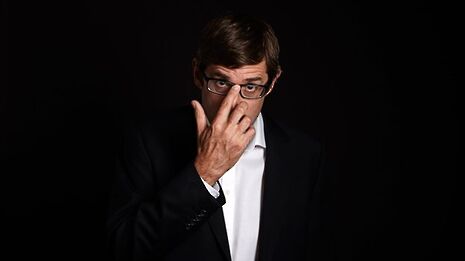TV: Savile
Louis Theroux’s documentary is more concerned with Theroux himself than with Jimmy Savile, making for an unadventurous documentary, says Alex Mistlin

Louis Theroux is an odd sort of celebrity. Over nearly two decades, he has slowly acquired the sort of cult following usually reserved for actors, popstars and primetime TV presenters. Central to his appeal is the unassuming ‘normal bloke-ishness’ that colours his many interactions with some of the world’s – though mainly America’s – weirdest individuals. One might even suggest that Theroux and Savile are two sides of the same coin. Both are men whose force of personality granted them extremely successful careers at the BBC. Savile, for his eccentricity, while Theroux for his normality.
However, this is not to say that the ex-Oxonian filmmaker is not good at what he does. On the contrary, he has a near-unparalleled ability to turn long, stand-offish encounters with deeply unpleasant people – Fred Phelps of the Westboro Baptist Church comes to mind – into unmissable hours of television.
While his latest film for the BBC, simply titled Savile, does not quite hit the heights of early noughties ‘classic Louis’, this is not for lack of trying. During the film’s 75 minutes, Theroux goes to some dark places in order to provide gritty insight into the mind of a national treasure turned disgraced public enemy. Savile’s crimes are discussed, dissected and denounced, primarily by his victims, but also by Theroux himself.
The film frequently harks back to When Louis Met... Jimmy, a 2000 documentary in which Theroux initially met with, and subsequently befriended, Savile. Intriguingly, some of the promotional material even describes Savile as Theroux’s “childhood hero”. Having never seen it previously (it is noticeably absent from Netflix) the ‘highlights’ shown here are even more shocking given the additional context provided by the nature of his crimes. An exchange in which he brazenly declares “I know I’m not [a paedophile]” shows the extent to which Savile considered himself not only above the law, but also above public criticism. I watched in amazement at the thought that Savile’s stardom barely waned in the years prior to his death, and how Theroux was sufficiently enamoured with him to consider him a friend for a decade after.
No doubt Savile’s exploration of the pair’s problematic relationship makes for what is, at times, a problematic film. In my opinion, it is Theroux’s attempt to reconcile their regrettable history with his own conscience that ensures this film is doomed from the start. Cast as both an accomplice and a victim, Theroux is compromised and, as a result, the tone is predominantly one of self-pity. He denies the notion that he was ‘groomed’ by Savile, but does attempt to conflate Savile’s sociopathic ability to manipulate those closest to him with the altogether more chilling details of his 40-year campaign of physical, psychological and sexual abuse.
Perhaps bizarrely, this is not a film about Savile at all. It is a film about his victims; the all-too-often abhorrent treatment of women and children and a simpler time in which the tabloids were unafraid to print salacious stories about the celebrity.
However, most of all this is a film about Theroux himself. This renders it myopic. Louis is the star. Consequently, the film loses some of its raw emotional power. His recent documentary about alcoholism, Drinking to Oblivion, was littered with heart-breaking moments when Theroux’s beautifully timed steps back left the audience confronted with the full force of someone’s personality. Here, his attempts to repeat the trick fall flat. The introspection only reveals Theroux’s guilty conscience and a gaping hole, dying to be filled with the details of Savile’s private life and motivation.
Savile then, is the story Theroux felt most qualified to tell. It is a valiant attempt, but I can’t shake the feeling that ultimately, where Jimmy Savile is concerned, there are more arresting and frankly more interesting stories to be told
 News / SU reluctantly registers controversial women’s soc18 December 2025
News / SU reluctantly registers controversial women’s soc18 December 2025 News / CUP announces funding scheme for under-represented academics19 December 2025
News / CUP announces funding scheme for under-represented academics19 December 2025 Features / Should I stay or should I go? Cambridge students and alumni reflect on how their memories stay with them15 December 2025
Features / Should I stay or should I go? Cambridge students and alumni reflect on how their memories stay with them15 December 2025 Fashion / The art of the formal outfit 18 December 2025
Fashion / The art of the formal outfit 18 December 2025 News / Dons warn PM about Vet School closure16 December 2025
News / Dons warn PM about Vet School closure16 December 2025








